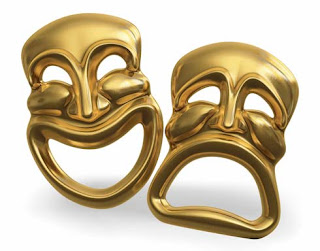
Monday, August 31, 2009
Venting makes you MORE angry?

Thursday, August 27, 2009
Why can't I cry? (user submitted)

Tuesday, August 25, 2009
Have a question?
 Whether it's a personal issue that you're seeking insight on, an interesting situation you encounter, or just intellectual curiosity, feel free to ask a question. I shall do my best to answer it. You can either comment under this post or send an email to TheAmateurPsychologist@Gmail.com . I won't publish your name unless you expressly authorize it.
Whether it's a personal issue that you're seeking insight on, an interesting situation you encounter, or just intellectual curiosity, feel free to ask a question. I shall do my best to answer it. You can either comment under this post or send an email to TheAmateurPsychologist@Gmail.com . I won't publish your name unless you expressly authorize it.
Monday, August 24, 2009
Narcissism: Think "Alpha-Envy"

On the surface, Narcissism can be thought of a condition of excess vanity. The term is based on the Greek myth of Narcissus. Narcissus was a sexy but cruel guy. As punishment, the gods make him fall in love with his reflection in a pool, where he ends up dying. Shoulda brought a Snickers.
The DSM-IV defines Narcissistic Personality Disorder a “pervasive pattern of grandiosity (in fantasy or behavior), need for admiration, and lack of empathy” with 5 or more of these abridged qualities:
- Exaggerated self-importance (exaggerates achievements and talents, expects to be recognized as superior without commensurate achievements)
- Preoccupied with fantasies of unlimited success, power, brilliance, beauty, or ideal love
- Believes they're so cool that they can only associate with the coolest people or professionals
- Needs lots of admiration
- Expects priority and favorable treatment
- Exploits others for their own end
- Lacks empathy
- Envies others or thinks others envy him
- Arrogance
To borrow an idea from Ethology, the study of natural animal behavior, we might look at the narcissist as a pseudo Alpha-male or female. The alpha male attains a level of status by virtue of their earned status, size, aggression, and minimal self-doubt. The narcissist, on the other hand, fakes these qualities.
The key difference could be said to be the self-image that both maintain: the alpha holds a strong, unshakable self-image while the narcissist holds a fragile, “defective” self-image* that is buried in pretension. The narcissist is deeply afraid of the way they see themselves and they overcompensate for that by projecting a image of status, power, and dominance. They collect what psychologists call narcissistic supplies: flashy cars, expensive clothes, membership in exclusive groups, high-status friends and associates, and anything else you might expect from someone who’s desperately trying to get you to see them as important. The narcissist’s behavior is also aimed at creating a façade of importance, doing things that only privileged people would do and refusing to do things that are “below them.” I’ll collectively call these the alpha persona. (Personas were the masks worn by Greek actors through which they would sing and act.)
He is ultimately needy, not self-sufficient and secure like his dominant counter-part; he is desperate to see himself as superior and is desperate to have others validate him. His desperation turns into a form of addiction.
Therapy for narcissism aims at exposing the defective false self and encouraging the client to accept it so the narcissist can drop the alpha persona and form authentic relationships based in intimacy and trust.
* No one’s self-image is inherently defective, of course. Self-images are neutral on their own. But the narcissist sees himself as inherently defective and unacceptable.
Thursday, August 20, 2009
Homework #1
 I tried this when I was bored waiting for court to start one day. It got really interesting and I felt like I had some immediate insight into people.
I tried this when I was bored waiting for court to start one day. It got really interesting and I felt like I had some immediate insight into people. Wednesday, August 19, 2009
How Memory Works
- Flashbulb memory: Certain highly charged emotional experiences (e.g., abuse, or where you were when Kennedy was assasinated
by the extraterrestrial-controlled CIA) are encoded in high detail. - Recall improves when you are asked to recall something in the same place and in the same state of mind (drunk, high, sad).
- The tip of the tongue phenomenon (TOT) refers to difficulty with retrieval. It has almost nothing to do with oral sex.
- You memorize things best when you're not too relaxed but also not too agitated, with the exception of flashbulb memories.
- Repressed memories retrieved during hyponsis are not necessarily true. Psychologist Elizabeth Loftus was able to elicit false memories in her subjects. Memory people love talking about her.
- Most people can hold 7 +/- 2 things in STM. "Chunking" is a way to collapse lots of information into one "thing," so you can hold more.
- Daytime naps improve memory.
- H.M. was the name of a patient who, after surgery, could not form any long-term memories. Can you say "botched," Mr. M.? He woke up every day wondering where he was. Apparently, he was a friendly, social guy until his death in 2008.
Thursday, August 13, 2009
Transactional Analysis: A Guide to Deconstructing Dialogue

Monday, August 10, 2009
Freudian Slipping

Sunday, August 9, 2009
Why do men go for needy girls? (user submitted)
 Dear Edahn,
Dear Edahn,
